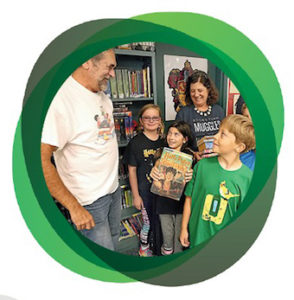PUBLISHED MAY/JUNE 2020
by
Malcolm Kushner, Fouder & Chair, Free Books for Kids --

Malcolm Kushner
Learn about the unfortunate trend that is happening to the books you are donating and what Free Books for Kids Founder is doing about it.
You’re a good person. So, when your kids have outgrown their board books, read-alongs, and chapter books, you donate them to a charity. The charity sells the books in its thrift stores along with used clothes, household items, and other donated goods. Several large national charities work this way. They use the store sales to fund their charitable endeavors. And you should be proud of yourself. You’ve recycled some books and helped raise money for a good cause.
But there’s something they don’t tell you.
There’s a limited amount of space in the stores. And new donations are constantly coming in. So, what happens to the books that don’t sell? The charities try to get rid of them by lowering the price. And if they still don’t move, the charities sell the books to a shredder, which turns them into pulp.
I learned about this several years ago. A large national charity had an outlet in Santa Cruz, California, where donated items were given their last chance to be sold, and a few large bins of books were always included. A grocery bag of these books could be purchased for $5. Books that didn’t sell went to the shredder. An unfortunate trend.
When out-of-towners visited, I always brought them to the outlet. Because who doesn’t want a grocery bag of books for $5? The breakthrough came when a fourth-grade teacher from Los Angeles was visiting.
The teacher looked through the book bins and went crazy. She filled several bags. At an average price of 10 cents per book, she built her classroom library for $20. That’s when the big disconnect hit me. How come a national charity was sending popular children’s books to a shredder when they could give them to cash-strapped elementary school students?

Tip #1: Always keep your eyes open for trends.
I never got an answer to that question. And that’s when
Free Books for Kids was born. From the fall of 2009 through the spring of 2010, I ran Free Books for Kids as a project for the
Boys & Girls Club of Santa Cruz. The club collected $2,000 in donations and gave out 20,000 books. We gave them to schools, low-income housing projects, community centers, migrant labor camps, and public health clinics. The project was a joy for two reasons: We loved giving books to disadvantaged kids, and we loved rescuing perfectly good books from the shredder.
Tip #2: Look for award opportunities.
The project won the Santa Cruz Red Cross Hero in Education award for 2010. Because we applied for it. Don’t hide your generosity or bury it with a press release that no one will read. There are lots of community service awards where your business is located. Research them and apply for them. Even if you don’t win, word will spread about your altruism and build goodwill for your business. And you might win.
Jump ahead a few years. The book project ended when I moved out of state. It’s now autumn 2013, and I’ve moved back to California. Sacramento to be exact. It’s only a couple of hours from Santa Cruz, and when I visited my old haunts, nothing had changed. The outlet still had bins full of popular kid books that were being sold or shredded every day. And it still made me sick that perfectly good kid books were being destroyed. So, I decided to do something about it.
On Jan. 1, 2014, Free Books for Kids was incorporated as a 501(c)3 based in Sacramento. The organization consists of six board members and a few volunteers, and we give out books all over Northern California.
Tip #3: Create a vision and set goals.
Our first goal was to create a vision. Our vision is simple. We believe that all children should have access to a variety of books at home and at school. We achieve our vision by providing free, recycled books to kids through schools and human service organizations. Our second goal was to give away 100,000 books in five years. So far, in our first five years, we’ve given out more than 135,000 books.
One of our favorite recipients is
Head Start. “The families at our SETA Head Start center love the Free Books for Kids program,” says Jessica Rainey of Head Start. “It gives opportunities for low-income families to have books to read to their children for bedtime and helps encourage literacy and early reading skills to the most vulnerable population of children. It also promotes family bonding in the households of our students.”
Free Books for Kids also has a unique way of celebrating National Read Across America Day, also known as Dr. Seuss Day. All year long, we save up Dr. Seuss books. Then, on National Read Across America Day, we pick a few schools and flood their kindergartens and first grades with Dr. Seuss books. For the last few years, we’ve given out more than a thousand Dr. Seuss books annually. The kids love them. And we always get our pictures in the local papers with a story about how many books we gave away.
Tip #4: Create an event tied to something in the news.
National Read Across America Day is covered by the press every year, and it’s a natural for any independent publisher. If you publish kid books, give some away. And alert the local media. If you only publish adult books, use your imagination. Give some books to teachers! That’s a great story. No one ever gives anything to teachers.
Tip #5: Set new goals.
Our new goal is to give away 500,000 books in 10 years. Our board has decided that we want to start rescuing and distributing kid books all over California and eventually nationwide.
Tip #6: Collaborate with others to do the work.
If you donate books to Free Books for Kids, we will get the books into the hands of deserving kids. This will promote literacy, bring enjoyment to underserved communities, and keep books from the shredder. We will also contact your local media to tell them about your generosity. Hey, bragging only works if someone else does it for you.
As Dr. Seuss once said, “You’re never too old, too wacky, too wild, to pick up a book and read to a child.” And as he might have said had he known what happens to many donated books, “You’re never too old to fork over the cheddar if it will save a kid book from the shredder.”
Malcolm Kushner is the founder and chair of Free Books for Kids. He is also the author of Public Speaking for Dummies
(Wiley), The Light Touch: How to use Humor for Business Success
(Simon & Schuster), The Official Book of Mob Humor
(RDR Publishing), and The Little Book of Humorous Quotes
(aka Associates).